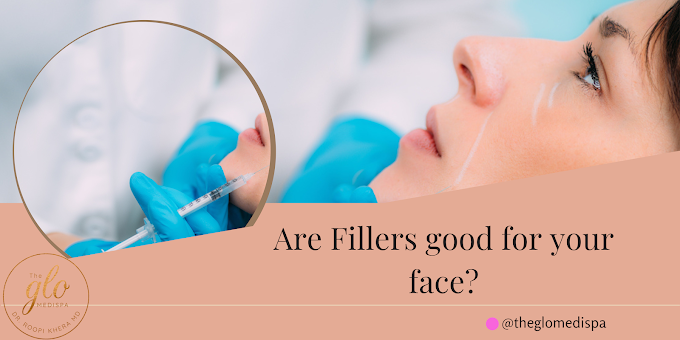Acne is a long-term inflammatory condition that affects the pilosebaceous unit, which includes the hair and the bulb that lies next to it and secretes natural oils to keep the skin hydrated. It is most common in teenagers, despite the fact that it can impact anyone at any age. Acne-related lumps and pimples heal slowly; one may reappear before the previous one disappears.
In some cases, infection and inflammation brought on by bacteria cause more severe acne. The severity and complexity of acne will determine how it is treated. Instead of relying on self-care and home remedies, it is imperative to get the right medical guidance for acne.
Dr. Roopi Khera, founder and chairperson of Glo Medispa, the best skin specialist in Ludhiana, has discussed the types of acne, their symptoms, and their causes in order to offer the necessary treatment.
What Causes Acne?
Causes of Acne:
These glands produce different kinds of sebum, which alters the environment's ability to support bacterial development (cutibacterium acnes). The epithelial tissue of the surface layer has a tendency to obstruct the opening of the pilosebaceous unit in addition to producing excessive and abnormal amounts of sebum. These factors cause the glands to expand, which causes painful red patches to appear on the scalp, arms, back, face, chest, etc.
In addition to this, certain individuals are more likely to develop acne. These are listed below:
- Hormones
- Poor diet
- Existing prescriptions
- Underlying medical conditions
- Moisture cosmetics
- Application of oil
- Certain clothing.
Types of Acne-
- Open pores (blackheads)
- Closed comedones (whiteheads)
- Papules (reddish patches or spots)
- Pustules (reddish patches with yellow fluid)
- Nodules (painful large and hard red spots)
- Nodulocystic (large painful inflamed lesions with thick walls and fluid).
Body Areas that are Affected by Acne:
- Chin
- Jawline
- Neck
- Scalp
- Chest
- Back
- Buttocks
- Shoulders.
When to See a Doctor?
- Delaying treatment or turning to home remedies only makes the condition worse and continues to worsen the outcome when it is a question of acne. Acne is treated more effectively and more quickly when it starts early, and acne scarring is also avoided. Early acne treatment also reduces the psychological harm caused by acne.
- Accepting treatment recommendations for acne from any relative, friend, salon employee, or other unqualified professional may not only cause a delay in care but also make the problem worse.
- Quick-fix creams and tablets for treating acne may do more harm than good because they may temporarily clear up the condition but leave behind long-term problems like acne exacerbation, skin thinning, unpleasant visible veins, and photosensitivity.
What to Expect at the Doctor’s Clinic?
Acne is primarily diagnosed clinically unless it severely affects the scalp, pubic region, and axilla in which case another diagnosis must be ruled out. One's acne will be thoroughly discussed with the doctor, including its duration and any accompanying symptoms. Before commencing the treatment, the doctor may ask one to have a couple of blood tests performed. Depending on the origin of the acne and its severity, the treatment approach may comprise a number of techniques. It might be as basic as using a few lotions or gels, or it can be as complex as using fractional lasers and microneedling. The procedure is gradual and step-by-step.
What is the Duration of the Treatment?
Although acne may clear up in around 6 to 8 weeks, one must continue using skin care products and changing one's lifestyle for two to three years to prevent a recurrence. One could require treatment for 12 to 18 months if they have severe acne. To cure both acne and acne scars, in-office treatments will be necessary for 6–8 sessions.
What is Acne Scarring?
- It's not entirely accurate to say that touching acne solely causes scarring. If untreated, acne will always leave scars. Although scarring varies depending on how deep acne lesions are.
- Ice-pick scars, which are typically interpreted as open pores, are left behind by black and white heads.
- Due to the greater quantity of tissue damage, rolling or box-shaped scars are frequently left behind by cystic and nodular acne.
- When acne is treated, the scars that are sometimes left behind are simple color changes in the skin. The kind of scarring that responds to the medication the best.
What Lifestyle Changes Can Help Prevent Acne?
- Cutting back on or quitting processed sugars
- Dairy products must be avoided
- Avoid processed wheat
- Maintaining a diet low in the glycemic index
- Routine exercise
- Increased hydration
- Try to avoid stress.
What are the Precautions to Take After Treatment?
- Limit exposure to the sun and stay away from tanning beds
- Don't get a salon facial or make face packs
- Don't wax or use bleach
- Avoid over-exfoliating
- After the treatment, avoid using the sauna, steam room, or pool for a week.
If one is looking for acne treatment in Ludhiana, one can book a consultation at The Glo Medispa to get consulted with acne specialist Dr. Roopi Khera. Consult now to avail the benefits of the best acne treatments offered at the clinic like lasers, chemical peels, medifacils, and many more!
.png)

.png)



.png)
0 Comments